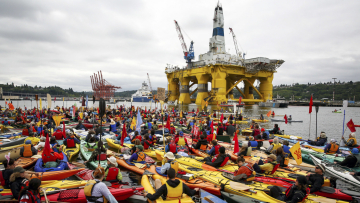Shell poses unacceptable oil spill threat
Anthony Field
t: 01483 412379
m: 07768 867274
e: afield@wwf.org.uk
Anthony Field
t: 01483 412379
m: 07768 867274
e: afield@wwf.org.uk
The European Bank for Reconstruction and Development (EBRD) should demand effective environmental protection measures for oil spills from Shell or decline funding to the project according to WWF. Currently the oil giant’s project will expose a highly endangered whale population and a pristine arctic environment to unacceptable risks from marine oil spills that could last for years.
A new report released today concludes that the highly dynamic sea ice conditions around Shell’s Sakhalin operation, which can dominate for more than six months of the year, would mean that the company would not be able to respond to a major oil spill for half of the year or longer. Traditional oil spill response methods are rendered impotent because of the predominant sea ice and prevailing weather conditions.
There is a very real potential that any unrecovered oil would contaminate the whales’ only known feeding grounds and the marine environment for years. This would put the last western gray whales in very real jeopardy. WWF commissioned the Considerations for oil spill response in broken sea ice conditions report from independent oil and gas experts.
“It is shocking to see that in the rush to develop new oil and gas supplies Shell is gambling with the environment,” said Robert Napier, WWF Chief Executive. “This is the worst place on earth to have to respond to an oil spill. Even with the latest technology and perfect weather conditions it would be impossible to clean up oil spills for 50 per cent of the time. During summer, wave height and wind conditions can overwhelm response technologies. In winter, the combination of dynamic sea ice, low visibility, and cold temperatures can shut down most large-scale response systems.”
In a briefing paper Shell proposes to use natural openings, called polynyas, in the sea ice to burn off any oil spills. However these ice clearings are a vital focal area for marine life from plankton to marine mammals. Burning oil in them could have impacts on the entire food chain that Shell has not considered.
Robert Napier continued: “The EBRD can not agree to fund this project if they are serious about their environmental values and want to maintain their credibility. If they go ahead and fund Sakhalin their social and environmental reputation will be in tatters.”
Shell has not produced oil spill models for the Sakhalin II project with sea-ice conditions. The report goes further in emphasizing that there are no existing mathematical models to predict the movement of oil in ice. Without this information the environmental impact assessment is incomplete.
The Sea of Okhotsk is one of the most challenging places to drill for oil with dynamic sea ice for six months of the year as well as dense fog, high winds and waves. However in the summer months it comes alive with a wealth of migratory species including the endangered Steller’s sea eagle and the western gray whale. Drilling for oil in such a fragile area important for wildlife is the reason why rigorous contingency plans should be in place for oil spills.
James Leaton, WWF oil expert, said: “There is a 24 per cent chance of an oil spill during the lifetime of this project. Oil spills this winter in Alaska and off northern must act as a warning. Neither spill was quickly detected and neither has been cleared up. The one off has killed thousands of birds – including some endangered ones. The lack of sufficient technology to clean up a spill in icy conditions raises serious questions over Shell’s and other company’s ambitions in the Arctic.”
- ends -
The EBRD are holding a consultation on whether or not they should fund Sakhalin II. This consultation was extended by a week and now closes on 28 April 2006.
Shell is the majority shareholder (55%) in Sakhalin Energy Investment Company Ltd, the company building Sakhalin II, with smaller partners including Mitsui & Co Ltd, (25%) and Mitsubishi Corp. (20%).
With pipelines cutting across 800 kilometres, crossing 1,000 watercourses and the construction of a drilling platform and a liquefied natural gas plant, Sakhalin II is currently the largest hydrocarbon construction project in the world. However, it has been bedevilled by cost overruns with the total cost now doubled to over $20billion. Since it has started construction it has broken a number of EBRD environmental and social policies.

